Not so long ago, former education minister Mladen Šarčević announced robots and holographic teachers in schools. Meanwhile, at the Oslobodioci Beograda Elementary School in Belgrade’s Palilula district the doors to the toilet cubicles do not work and the toilet seats are either broken or non-existent. A student at the school simply describes the toilet hygiene: “It’s disgusting!”
Nonetheless, the situation in Belgrade schools, according to public health institute data, is not as bad as in rural environments.
In a satellite unit of the Stanimir Veljković – Zele Elementary School in Mrveš, 30 kilometers from Leskovac, students still use outhouses in the yard, one of which does not even have a door.
In the vicinity of Leskovac, at least six more schools had only outhouses in 2019, whereas just a few years earlier some schools did not even have sewerage or a septic tank, and the employees had to bring bottled water.
According to research conducted by the Center for Investigative Journalism of Serbia (CINS), there is a growing number of schools that have problems with hygiene and toilets.
Every year, local public health institutes tour schools across Serbia and check the conditions that could affect children’s health, primarily hygiene. According to the data provided by 27 institutes that we analyzed, 6.41% of monitored schools did not have any or had inoperative sanitation facilities, i.e. toilets, sinks and other hand washing devices in 2016, and 8.83% in 2019. That means that, according to the latest data, at least 87 schools and satellite units do not have toilets or hand wash sinks.
This number may even be bigger because not all schools are checked in a year, rather about a third of them. Representatives of the Institute of Public Health of Serbia Dr Milan Jovanović Batut, where an annual, collective report is made based on the findings of nationwide public health institutes, believe that a third is enough because checks are carried out continuously. They think that the report shows only “seemingly worse results,” because buildings that are potentially riskier are supervised.
“Since, for various reasons, it is most often impossible to tour all school buildings every year, when planning their annual activities the district bureaus and public health institutes opt for buildings with less secure water supply sources and waste disposal,” the Batut representatives said in their reply.
Citizens on the subject of school toilets
In a bid to get an image of the situation in a large number of elementary schools in all of Serbia, not just in those checked by the local institutes, CINS invited readers to send information on and photographs of school toilets. We asked what the state of the toilets was, whether they had soap, paper towels and disinfectants, as well as whether the situation changed after the outbreak of the coronavirus epidemic.
Almost 60 readers from 23 places in Serbia answered the appeal, describing the situation in schools and sending photographs and video footage.
An analysis of the data reveals that in close to a third of elementary schools there are either not enough or no disinfectants, soap and paper towels, while five schools have them only because the students’ parents buy them.
Parents did this before but also after the outbreak of the coronavirus pandemic, which CINS reported on. In the case of 17 elementary schools, the parents and students said they had the impression that the pandemic had not brought an improvement in hygiene. In schools where they notice an improvement, they highlight intensified cleaning and better hygiene.
Selma Bihorac of the Public Health Institute in Novi Pazar confirms that there are problems with sanitation facilities, primarily in rural satellite classes attended by a smaller number of students, but believes that should be rectified:
“That can be enhanced, of course, regardless of the fact that there is a small number of children. You have to provide some basic hygiene conditions for every child, for the time they spend there.” Out of the 21 schools this institute monitored in 2019, nine did not have functioning sanitation facilities.
The Zlatibor District, i.e. the vicinity of Užice and Prijepolje, has the biggest number of schools with poor hygiene. The reason for that is mainly unsafe drinking water, doctor Olivera Janjić from the Užice Institute explains. Where the vicinity of Šabac is concerned, at least 21 schools have outhouses.
Squat toilets in the bathroom at the 3. Oktobar Elementary School in Bor; source: a CINS reader
Representatives of the Ministry of Education, Science and Technological Development explained to CINS that the maintenance of school buildings was under the jurisdiction of local self-governments, but also that the Ministry had gotten involved due to the coronavirus epidemic and handed out hygiene products and equipment to schools. Nevertheless, instead of commenting on the aforementioned problems, the Ministry officials claim that, according to their information, there are no serious problems with hygiene maintenance in schools.
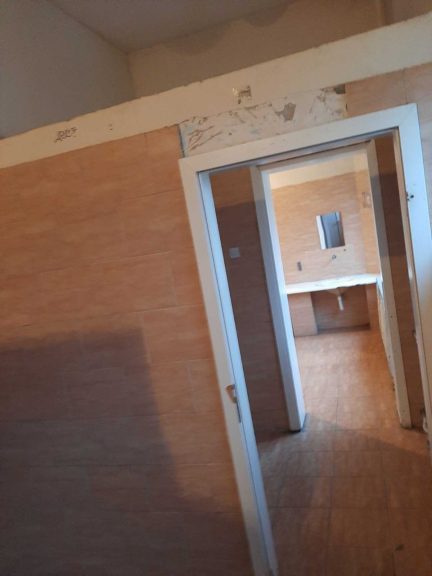
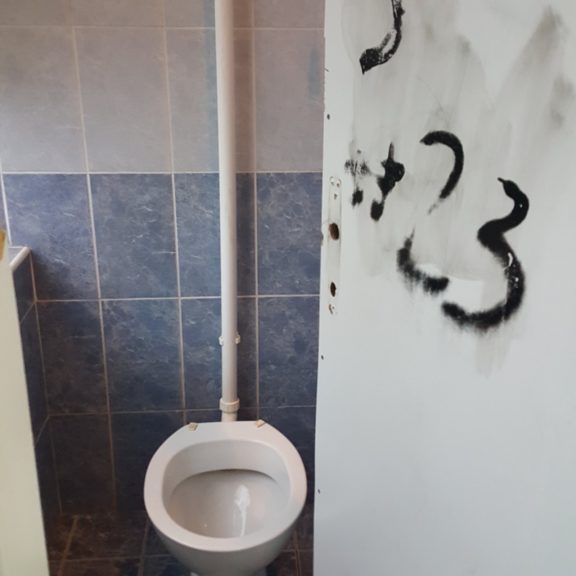
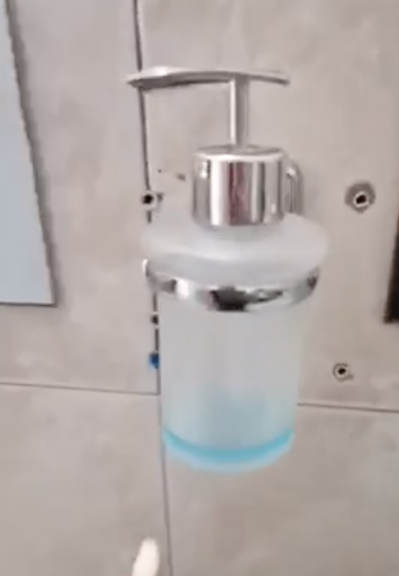
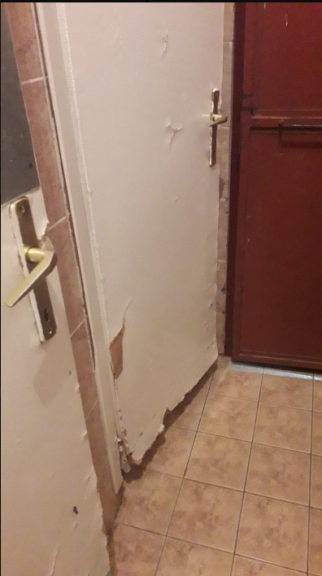
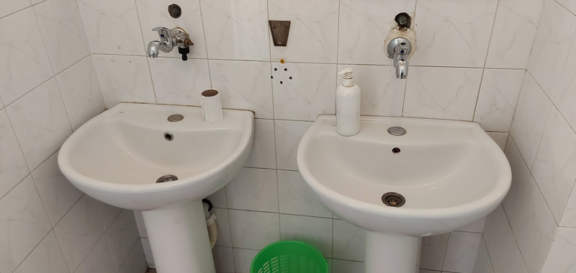
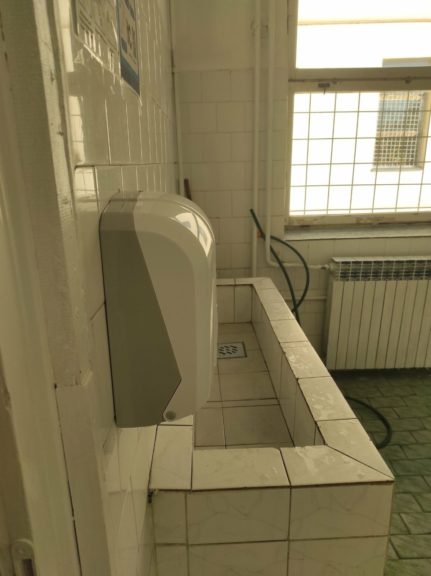
Toilets in elementary schools across Serbia, photographs sent to CINS by citizens
The situation is generally better in Vojvodina, but in some schools there is a risk to children’s health.
In a school in the municipality of Kula, children’s health is endangered because the toilets are unusable, explains Jelena Zelić, head of the Center for Hygiene and Human Ecology of the Sombor Public Health Institute.
“There are no doors, the pipes are rusty, they’re squat toilets. A squat toilet is a hygienic form of toilet, but this one is rusty, run-down. Disinfectant can be poured there infinitely, but it’s basically pointless. Some reconstruction simply has to be carried out,” Zelić says.
She did not wish to reveal the name of the school, but CINS found out that it was Vuk Karadžić Elementary School in the small town of Crvenka, not far from Vrbas, which is currently attended by around 850 students. The school principal, Nataša Đerić, declined to comment on the allegations.
According to the data we received from the Ministry of Education, in 2019 this school requested, among other things, 10.6 million for the reconstruction and maintenance of sanitary blocks, but the funds were not green-lighted.
Instead, in 2020 the school received 583,000 for replacing worn out classroom furniture. Ministry officials explain the decision by saying that the toilet repair project is too costly for the Ministry, that there are many such requests from other schools, adding that they also took into account the fact that the project is not co-financed from other sources.
“It can also be stated that the amount of the request from the school in Crvenka for the allocation of investment funding greatly exceeds the funding that may be awarded to a single school. (For all works on all elementary schools in Serbia 89 million dinars was earmarked in 2019 and 81 million in 2020) and that is also one of the reasons why the Ministry did not set aside funds for that project.”
When the school does not do it, the parents sometimes manage on their own and finance the necessary repairs. In the Bratstvo Jedinstvo Elementary School in Kucura, near Vrbas, the parents themselves paid for the painting of walls, radiators, doors, and parquet planing in some of the classrooms. Jasna Međeši, the mother of a student, says that no one forced them to do it, rather it was proposed at a meeting of the Parents’ Council.
“There are no hygiene products, the school did not even provide them, but some of the teachers made an arrangement with the parents and they bring soap, paper towels and toilet paper,” she said.
Health risk
If hygiene in toilets is poor, there is a risk of infection transmission, explains pediatrician and immunologist Nevenka Raketić:
“There are two main infection transmission routes: aerosol (coughing, speech, sneezing etc.) and orofecal. From the stool, especially in children, it can go directly into the mouth if they do not wash their hands well. The consequences can be viral infections, rotavirus and adenovirus, even hepatitis A can be transmitted in that way, and parasites can be transmitted, then that requires really serious treatment.”
If children avoid going to the toilet at school, or there isn’t one, that will not leave permanent consequences, adds Raketić. However, by doing so they prevent the normal functioning of all organs, primarily the digestive tract:
“In small children in particular, a urinary or fecal retention reflex is created, that becomes a psychological problem and then it is difficult to treat.”
Serbia among the few countries in Europe without basic conditions
UNICEF, the world organization focusing on children’s rights, also pays special attention to school hygiene. Every year, the organization checks whether children have access to drinking water and sanitation facilities in schools.
According to the 2018 report, Serbia, Croatia, Moldova and Hungary are the only countries in Europe that have schools without basic hygiene conditions, while Serbia and Croatia are the only ones in Europe with schools that do not have access to drinking water.
In earlier reports, the organization also conducted student surveys in Serbia, and so in 2014 71% of the surveyed students said they were not happy with the state of their school toilets, while more than 60% of them said they avoided going to the toilet while at school. As much as 96% claimed at the time that there was no toilet paper in their school.
“Then children touch those surfaces, and then touch their eyes or mouth. Especially in coronavirus conditions, that was the number one thing to avoid, to have time between classes to disinfect or wipe [the surfaces].”
The Batut report says that a contaminated environment may cause or worsen health problems:
“They can be acute impacts on health, such as infectious diseases, respiratory infections or asthma, which results in absence from school and reduced work capacity. Damage to health such as malignant or neurological diseases may occur later in life.”
In spite of that, hygiene in schools has been improving year in, year out, the Batut representatives say in their official reply to CINS.
“Based on the findings so far, we do not consider schools to be high-risk places for children.”
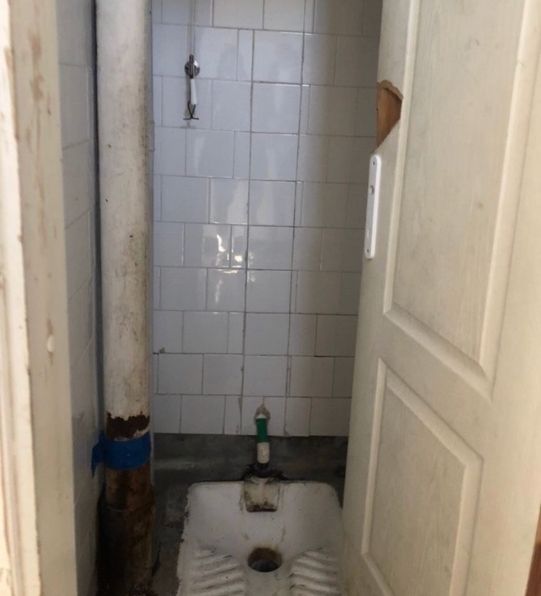

What do you think